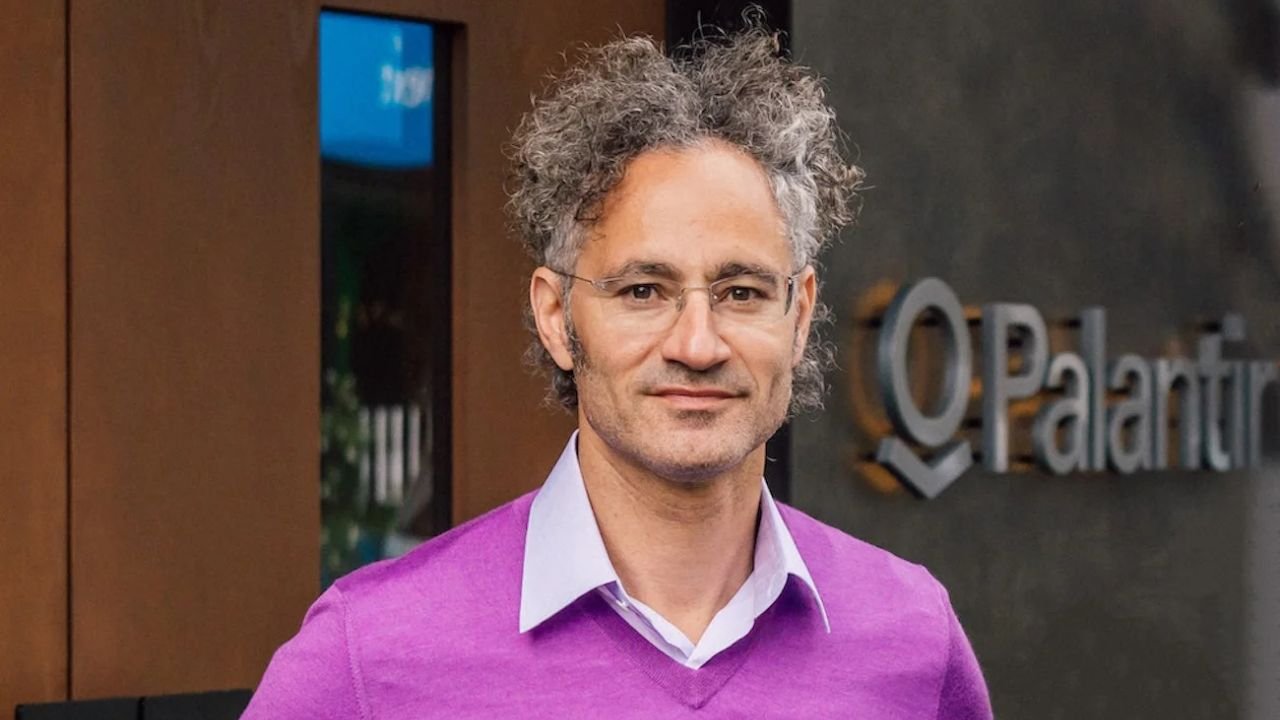
Palantir Founder Alex Karp: The Philosopher CEO at the Frontlines of Data, AI, and National Security
In the fast-evolving world of technology and defense, few figures embody paradox as vividly as Palantir founder Alex Karp. He is a philosopher turned tech mogul, a man more at ease quoting Goethe and practicing tai chi than mingling in Silicon Valley’s elite circles. Yet, he stands at the very center of debates about artificial intelligence, data privacy, surveillance, and the future of modern warfare.
So how did a daydreaming doctoral student in German philosophy become the CEO of Palantir Technologies, a $60+ billion data analytics giant deeply embedded in U.S. defense and intelligence? To answer that, we must trace Karp’s unique background, his company’s controversial rise, and the ethical dilemmas that define his career.
Early Life and Education of Alex Karp
- Birth & Background: Alex Karp is a New York-born child raised beyond the borders of Philadelphia, in a socially progressive family. His father was a Jewish pediatrician and mother, who was a Black artist, was a civil rights activist.
- Activism Influence: Karp grew up in a household that appreciated social justice issues and as a child was exposed to protests and marches at an early age. This experience influenced this worldview in that he felt like an outcast and had a large degree of willingness to question conformity.
- Academic: Karp studied philosophy and has a bachelor degree from Haverford college, a law degree from Stanford University, and finally a PhD in German social theory from Goethe University in Frankfurt. His dissertation centered around the themes of aggression and alienation—a precursor of his future work of interpreting human behavior with data.
Unlike many Silicon Valley founders, Karp did not emerge from engineering or computer science. Instead, his background in philosophy gave him a unique lens for interpreting technology’s role in society.
The Birth of Palantir
Palantir Technologies was founded in 2003 by a group of visionaries, including Peter Thiel (Karp’s Stanford Law School classmate), Nathan Gettings, Joe Lonsdale, and Stephen Cohen. Its mission was clear: use big data analytics to identify hidden patterns that could prevent terrorism and crime.
In-Q-Tel, the CIA venture capital arm, is among the earliest investors that have invested close to 2 million dollars to support the development of the software and is among the first backers of Palantir. This solidified Palantir as a company that was founded in the nexus of Silicon Valley technology and Washington national security.
The company is named Palantir, after a Tolkien character of the same name: the palantiri were the seeing stones of the lord of the rings. This inspiration continues to affect the culture of the company that has their head office in Palo adorned with Tolkien-inspired decor, the so-calledShire.
Alex Karp’s Leadership Style
Karp stands out among Silicon Valley CEOs. Where others wear hoodies, he prefers tight T-shirts, jeans, and tai chi movements. He dislikes the spotlight, yet finds himself at the core of debates about surveillance and AI.
Some defining traits of his leadership include:
- Philosophical Decision-Making: Philosophy of Work Palantir In many of his comments, Karp discusses the work of Palantir in moral or existential terms. In his insistence, he says that technology itself is dangerous but contends that it is for the West to utilize it as opposed to powers like China utilizing technology.
- Outsider Mentality: Karp forthrightly acknowledges that he does not possess the personality that fits with the Silicon Valley elites but would rather gravitate to the policymakers and those of the defense community.
- Charismatic Eccentricity: Like to be quoted as to have said in German, offer wiseguy sarcasm about how he feels awkward in social situations, and apparently even once knock over a visitor when practicing tai chi, Karp is something of a philosopher and performer, not to mention strategist.
James Carville, the Democratic strategist and informal Palantir adviser, once said of him: “He’s one of a kind, to say the least.”
Palantir’s Role in Defense and National Security
Palantir’s core strength is its ability to analyze vast, disparate data sets and find hidden connections. This makes it indispensable to intelligence agencies, militaries, and corporations worldwide.
Major Contributions
- Counterterrorism: After 9/11, Palantir’s software became crucial in predicting terrorist networks and preventing attacks.
- Military Operations: Its platforms help special forces coordinate missions, track drone movements, and analyze battlefield intelligence.
- Global Conflicts: Palantir has supported Ukraine in its war against Russia and Israel in missile defense, sparking both praise and controversy.
- Government Agencies: Beyond defense, Palantir assists the IRS in uncovering tax fraud, the FDA in monitoring supply chains, and health agencies in crisis response.
Controversies Around Palantir and Alex Karp
Despite its success, Palantir is one of the most controversial companies in the tech world. Critics argue that its technology veers dangerously close to mass surveillance and Big Brother-style oversight.
Some controversies include:
- Privacy Concerns: Human rights organizations have criticized Palantir of assisting governments in conducting overinvasive surveillance of citizens.
- Dealings with ICE: Its dealings with the U.S. Immigration and Customs Enforcement (ICE) to locate undocumented migrants attracted protests, which included strikes at Palantir locations.
- Military Ethics: Using Palantir to generate autonomous warfare will feed a Killbot panic and the robotization of war.
- Political Relations: Co-founder and Former Vice President of PayPal Peter Thiel was a supporter of Donald Trump, which means that Palantir came under investigation because of its government ties.
Karp, however, defends Palantir’s mission, stating, “The only solution to stop AI abuse is to use AI.”
Palantir Founder Alex Karp vs. Elon Musk: Philosophers of the Future

Alex Karp is often compared to Elon Musk, as both are unconventional tech leaders reshaping America’s role in AI and defense. However, their approaches differ:
| Feature | Alex Karp (Palantir) | Elon Musk (Tesla, SpaceX, xAI) |
| Background | Philosophy PhD, outsider to Silicon Valley | Physics & economics, hands-on engineer |
| Focus | Data analytics, defense, intelligence | Space travel, AI, electric vehicles |
| Philosophy | West must dominate AI to prevent adversaries from abusing it | AI is a threat; must be regulated cautiously |
| Public Persona | Reclusive, eccentric, intellectual | Outspoken, controversial, highly public |
| View on War | AI is essential to national security | More focused on space and civilian tech |
Ethical Dilemmas: Is Alex Karp a Hero or a Villain?
To some, Alex Karp is a defender of Western values, helping safeguard democracies against terrorism and authoritarian states. To others, he is an architect of the digital surveillance state, enabling governments to intrude into private lives.
Karp embraces this tension, stating, “If you have a position that does not cost you ever to lose an employee, it’s not a position.”
This moral complexity defines both him and Palantir. The company is celebrated in Ukraine but condemned for its ties to Israel’s military operations. It is praised for saving lives but criticized for undermining privacy.
Key Lessons from Alex Karp’s Journey
- Unconventional Paths Can Lead to Innovation – A philosophy PhD can build a defense tech empire.
- Moral Complexity is Inevitable in Technology – Every powerful innovation raises ethical dilemmas.
- Outsiders Often Lead Disruption – Karp never fit into Silicon Valley, yet he shaped its most controversial company.
- National Security and AI Are Intertwined – The future of warfare will be determined by data and algorithms, not just soldiers and weapons.
Conclusion: The Legacy of Palantir Founder Alex Karp
Palantir founder Alex Karp remains one of the most enigmatic figures in global technology. He is a man who reads Goethe, practices tai chi, and rails against conformity—yet leads a company at the epicenter of modern warfare and surveillance.
He is a synthesis of our mixed times: thinker and fighter, dreamer and realist, savior and megalomaniac. History may choose to remember Mark Zuckerberg in either way, as promoting the ideology of democracy or as the founder of dystopian surveillance, but the contribution that he made in the field of AI, data and national security is undeniable.
In the wake of the world rushing headlong into an age of autonomous warfare and AI decision-making, Alex Karp both preaches and reminds all that technology is only as ethical as we are.
Read More About: Leadership Moves: Palantir CEO Sells Shares, Company Stays in Spotlight


